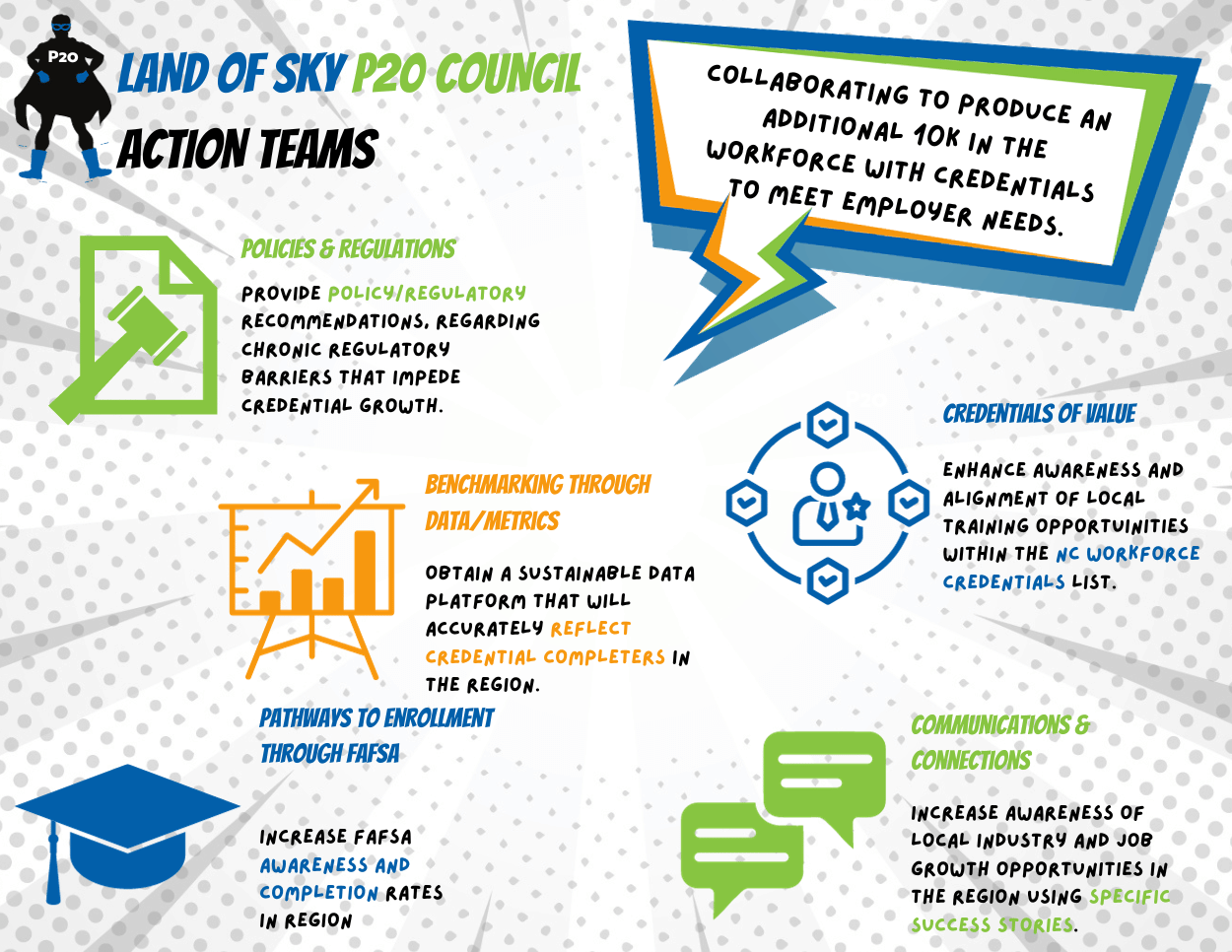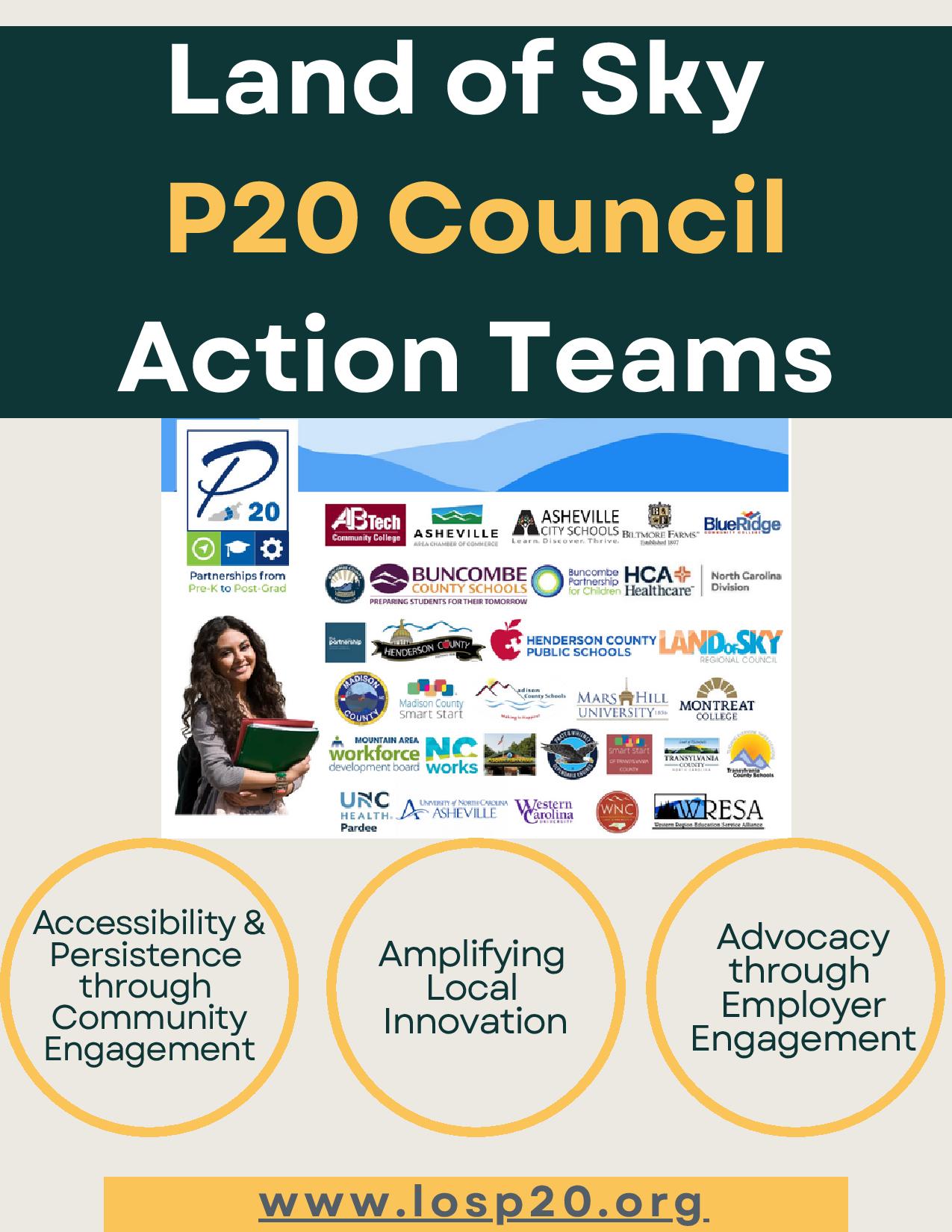Action Teams
Small leadership teams with cross-sector membership focused on solving the most pressing problems in our region’s cradle-to-career pipeline.
What Are Action Teams?
Nested within the larger P20 Council are Action Teams, which are created in odd-numbered years for each two-year cohort of Council members. The Executive Director works in conjunction with the Executive Steering Committee to select a short list of priority problems to be addressed in each two-year term. Then, Action Teams are created to solve each of those key problems. Each Action Team is tasked with coming up with solutions to their assigned problem and then implementing the best solution(s) they identified. It is primarily through the work of our Action Teams that we advance our goals and our policy priorities.
How Are Action Teams Organized?
Four to six P20 Council members serve on each Action Team. One of the key strategies for maximum effectiveness is to employ a mix of expertise on each Action Team, with representatives from multiple sectors and educational levels.
To ensure they are focused on their specific problem, each Action Team is given a Key Question, a Purpose (the answer to the question, “What current gap guides our work?”), and a desired Outcome (the answer to the question, “How will our work be felt by the community?”).
What Problems Have the Action Teams Been Focused on Solving?
Our Action Teams are the drivers of many of our initiatives to align the various components of education to the workforce pipeline in order to create a seamless transition from educational attainment into gainful employment. We develop each cohort of Action Teams to be responsive to the changing needs of our education and workforce landscape. Click on the links below to learn more.
Action Teams for 2021-2023

Benchmarking through Data/Metrics

Communications & Connections

Credentials of Value
Key Question
What’s the method for measuring credential completers and alignment to the local job market and how do we ensure such data is centric for educational attainment goal-setting among the Land of Sky’s stakeholders?
Purpose: What current gap guides our work?
Currently, there isn’t a one-stop source for credential completion data that is time-relevant, local and consumable for the community.
Outcomes: How will our work be felt by the community?
P20 will lead efforts to obtain a medium/software platform that will accurately reflect credential completers in the region with information that is accessible to stakeholders in a live, consumable format. This will establish a long-term sustainable system that will effectively measure credential completers and can be correlated to the local job market to identify gaps and guide decision-making among training providers.
Projects that the Benchmarking through Data/Metrics Action Team Contributed to
- The State of Our Workforce: Western North Carolina survey and analysis
- New Key Performance Indicators (KPIs), vetted by the full Council for each Strategic Direction
- Graphic representation of our goal progression
- Our region’s first Education & Workforce Symposium
- First pilot set of credential measurements agreed upon by staff at both community colleges with measurements of completers beginning for end of Spring 2023, and continuing into Summer and Fall thereafter
Key Question
How do we increase awareness and value of credentials to and through the community, educators, and employers?
Purpose: What current gap guides our work?
There are a variety of educational attainment marketing measures employed by public and private training providers but gaps still exist between employer needs, workforce preparedness, and educator awareness.
Outcomes: How will our work be felt by the community?
P20 will lead efforts to examine & execute measures for increasing educator awareness of local industry and job growth opportunities in the region and it will aid training providers in marketing short term credentials to the emerging workforce, particularly career pathways with multiple entry and exit routes and transfer/articulation routes to universities.
Projects that the Communications & Connections Action Team Contributed to
- Used the The State of Our Workforce: Western North Carolina survey results to determine targeted career pathways: healthcare, transportation/logistics, manufacturing, tourism
- Introduced high school students to some of our region’s manufacturing careers via a #worklocal campaign with Elkamet
- Enhanced high school students’ interest in healthcare careers via a #worklocal campaign with Mission Health
Key Question
How will the P20 Council advocate for the region’s credentials of value?
Purpose: What current gap guides our work?
NC’s Community College system office has embarked on a mission to categorize credentials that lead to family sustaining wages across the state and this work interconnects to the myFutureNC and local collaborative (i.e., P20) efforts. They’ve developed a list of credentials for community awareness but this list is not currently aligned to local training provider programs of study, particularly within our Land of Sky’s community colleges.
Outcomes: How will our work be felt by the community?
The P20 Council will be an advocate for the awareness of credentials offered by the region’s training providers, with a particular focus towards aligning local industry needs to existing or emerging training programs, especially those featured within the new NC Workforce Credentials list.
Projects that the Credentials of Value Action Team Contributed to

Pathways to Enrollment through FAFSA

Policies & Regulations
Infographic of All Five Action Teams
Key Question
How do we assist partners in increasing our region’s FAFSA completion rates and identify other means to increase enrollment and completion of postsecondary opportunities?
Purpose: What current gap guides our work?
Research has proved that FAFSA completion is a key indicator for enrollment and completion of postsecondary opportunities. Yet, most high schools within the Land of Sky region experience less than 50% completion among their senior class rosters.
Outcomes: How will our work be felt by the community?
P20 will increase FAFSA awareness and completion rates in the region and acquire expository evidence of other barriers that impede student enrollment in postsecondary opportunities so that those may be acted upon by stakeholders.
Projects that the Pathways to Enrollment through FAFSA Action Team Contributed to
- Conducted a needs assessment with high school and community college counselors in four counties to determine gaps
- In response to that needs assessment, created our FAFSA PACK resource to assist with FAFSA promotion
- FAFSA Sweepstakes campaign
Key Question
How can the region’s leaders collectively advocate for long-term growth of successful strategies that lead to credential attainment?
Purpose: What current gap guides our work?
There are a variety of serious regulatory barriers that impede growth along the educational continuum and the Land of Sky region lacks a representative body to collectively advocate for changes that could positively impact educational attainment from early childhood through post-secondary environments.
Outcomes: How will our work be felt by the community?
P20 will provide policy/regulatory recommendations, vetted by all members, to statewide partners and elected officials regarding chronic regulatory barriers that impede growth surrounding the four indicators of credential growth (early education enrollment, K12 success, postsecondary completion, and employer credential alignment).
Projects that the Policies & Regulations Action Team Contributed to
-
- Developed the Land of Sky P20 Council’s first Policy Agenda
- Produced and distributed an Advocacy Toolkit
- Developed the Land of Sky P20 Council’s first Policy Agenda
Agendas and minutes for Action Team meetings can be found here.
Action Teams for 2023-2025
See our Events page for details on upcoming action team meetings.

Accessibility & Persistence through Community Engagement

Advocacy through Employer Engagement

Amplifying Local Innovation
Motivated to Close Current Gaps in:
- Early Childhood Education: mismatch between supply and demand
- K-12 Education: local career exposure & corresponding credential alignment
- Postsecondary Education: financial aid complexities
- All: communication channels to and through underrepresented communities
Addressing Gaps through Outcomes Such As:
- Input from diverse community members impacted by gaps in every tier in the P20 continuum
- Disseminating information on resources that can address gaps
- Filtering national and statewide trends/news to members and partners affecting the gaps
Measuring Impact via:
- # of targeted communications
- # of community members providing input
- # of special initiatives targeting gaps
Informing Other Action Teams & Full Council by:
Identifying local barriers that may require local policy advocacy
Overall P20 KPIs Affected:
- # of Students Who Graduate with a Credential
- % of Students Cross-Enrolled during K-12
- # & % of Children in Licensed Care
- # of Licensed Sites Serving 0-5-Year-Olds
External Expertise Sought from:
TBD
Motivated to Close Current Gaps in:
Employer investment for:
- Early Childhood Education: workforce availability & attrition
- K-12 Education: work-based learning
- Postsecondary Education: training alignment
Addressing Gaps through Outcomes Such As:
- Greater employer involvement within the entire continuum
- Employer awareness about local & state laws that affect their current & future workforce
Measuring Impact via:
- # of public-private partnerships nourished
- # of advocacy topics for each tier of continuum vetted by Council & derived from employer input
Informing Other Action Teams & Full Council by:
Creating an inventory of advocacy needs
Overall P20 KPIs Affected:
- # of NCWorkforce Credentials Earned in the Region
- # & % of Program Completers in High-Growth Industry Sectors
External Expertise Sought from:
TBD
Motivated to Close Current Gaps in:
All educational tiers (early childhood education, K-12 education, and postsecondary education):
- Regional knowledge of promising practices that show positive results towards our goals across the continuum
- Funding to create or sustain innovative strategies
- Regional buy-in towards P20’s role in positively affecting the above
Addressing Gaps through Outcomes Such As:
- Research grants that are appropriate for each tier
- Determining grants that are appropriate for P20 to assist with writing and/or endorsing
- Planning and executing a forum to showcase innovative practices
Measuring Impact via:
- # of promising practices identified
- # of grants identified
- # of new operational contacts for P20 network
Informing Other Action Teams & Full Council by:
Creating an inventory of promising practices for each tier for scalability potential
Overall P20 KPIs Affected:
- # & % of Students Persisting Past the First Year of Postsecondary Education
- # of Students Enrolling Into College Courses
External Expertise Sought from:
TBD
Overview of All Three Action Teams
Agendas and minutes for Action Team meetings can be found here.


